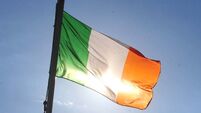Presidential oath means only Christians need apply

Eamon de Valera and Archbishop McQuaid. Date and location unknown. (Part of the Independent Newspapers Ireland/NLI Collection). (Photo by Independent News and Media/Getty Images)
Before Éamon de Valera put his new constitution to the people in a nationwide plebiscite in 1937, he sent an envoy from the Department of External Affairs to the Vatican in order to try and get it endorsed by Pope Pius XI.
This mission underlines the approach that was taken in drafting the document we still live with today. It is a Catholic document which has been chipped away through various referenda over the decades.
















